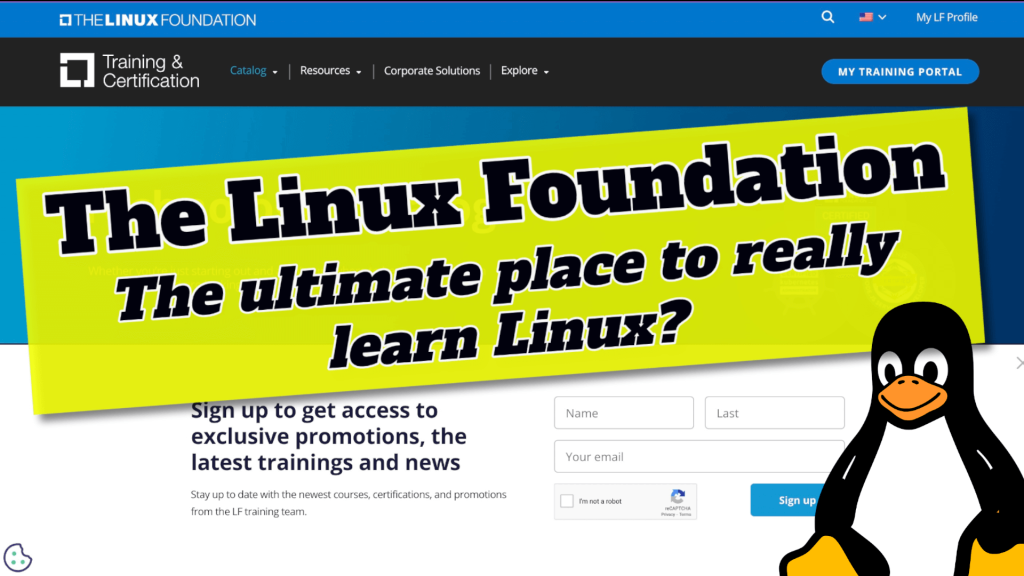Table of Contents
Introduction to The Linux Foundation
The Linux Foundation’s course catalog is chock full of tech education options ranging from Networking and Blockchain to Linux Kernel Development and System Admin, Web Development and more.
- But what’s up with their prices?
- And are these certifications even legit?
I’m showing you all the gooey open source guts in today’s review of The Linux Foundation.
I’m going to start off with a fun fact, just to set the tone of this educational platform.
Drum roll please 🥁
More than half of all Global 2000 software and telecom companies are members of the Linux Foundation and their projects.
Here are some of their projects:
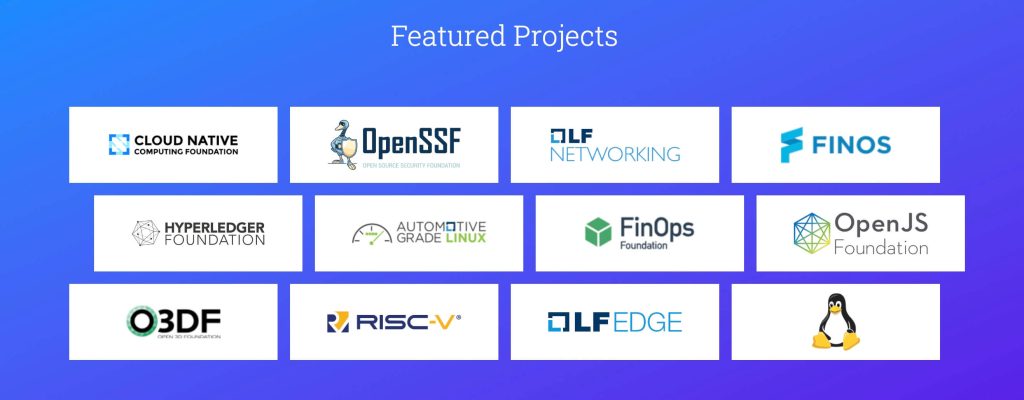
Oddly, many people have never heard of the Linux Foundation.
But this foundation is everywhere.
- If you’ve coded in the past…
- If you’ve used a code editor or an extension…
- Or even just thought about the inner workings of Node.js…
- You’ve probably brushed up against the Linux Foundation in some way.
This is a very well respected organization, and I would even go as far as calling it prestigious.
Training, Courses, Bootcamps and Curriculum
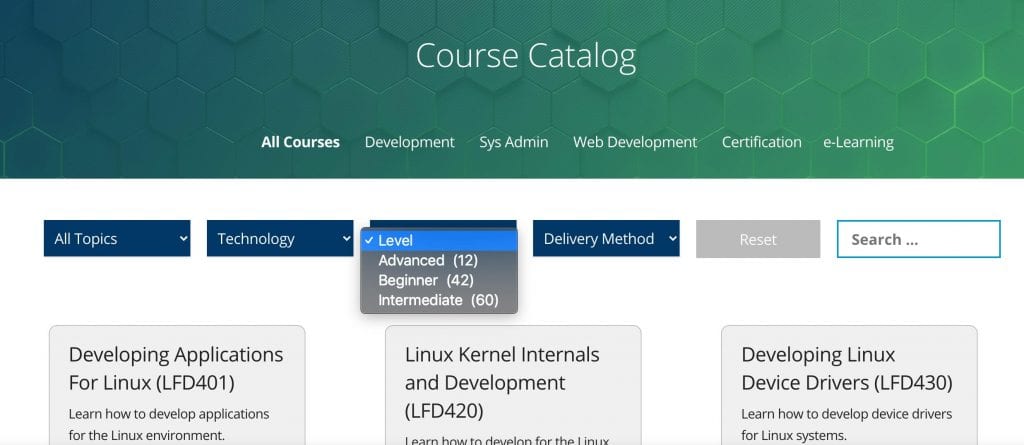
The Linux Foundation offers a pretty diverse mix of training. They have a lot of different tech categories, including:
- Systems Administration
- Cloud and Containers
- Networking Cybersecurity
- Blockchain
- Linux Kernel Development
- all the way to Open Source Best Practices.
They also offer different formats.
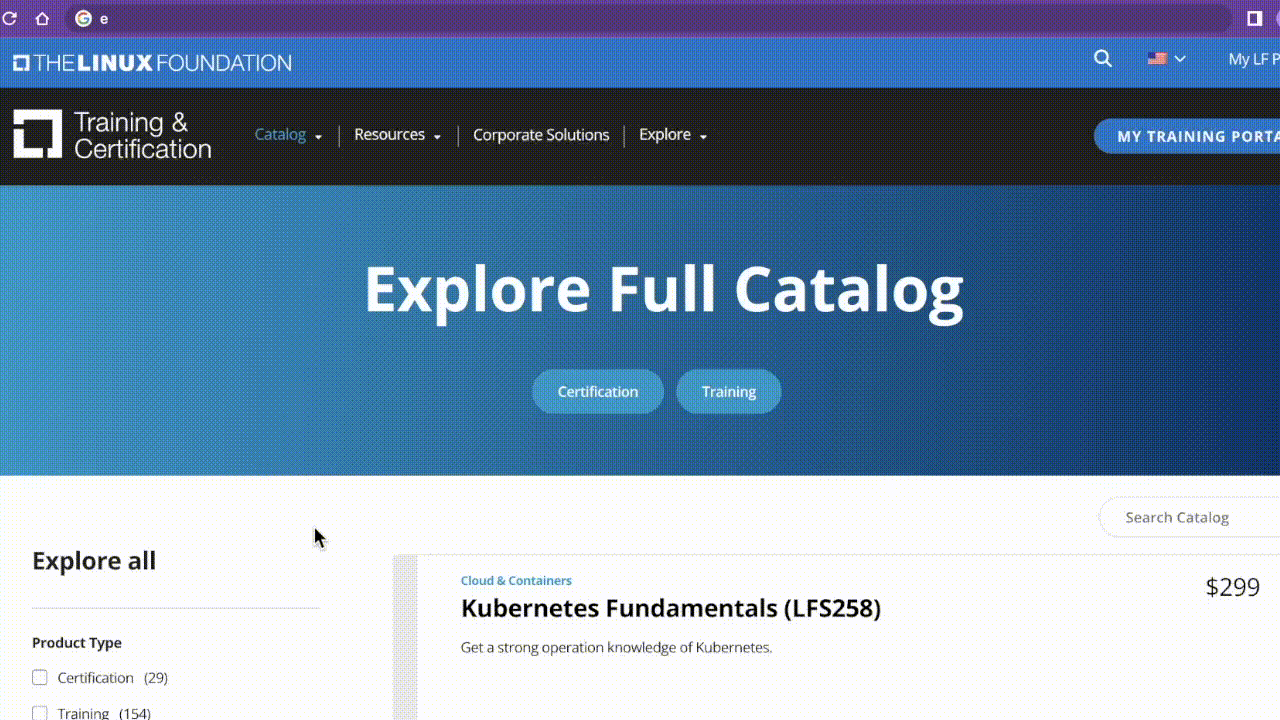
For example, they have regular ol’ courses, they have a SkillCred catalog which focuses on a specific skill like text editing with Vim.
They also offer bootcamps.
The Linux Foundation also offers live trainings.
These are the most expensive offerings I’ve seen on this platform.
For example this Developing Applications for Linux instructor-led course is $3250.
It runs from 9 am to 5 pm for four days straight and you’re doing Linux stuff™.
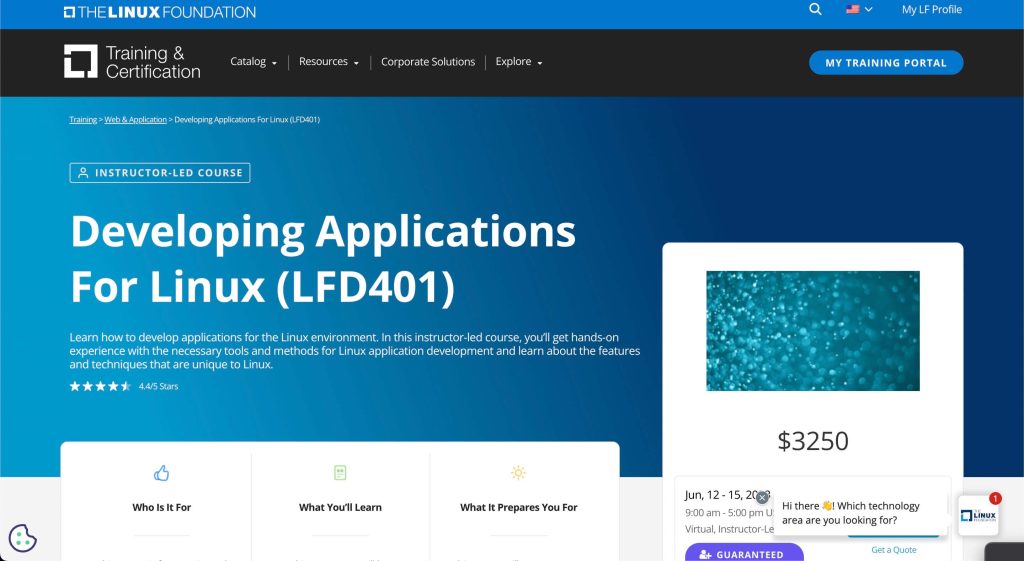
…A lot of cool Linux stuff:
👾 Debugging and core dumps
🛠 Async i/o
🔌 Lots of stuff on sockets
and so on.
Pricing
Now compared to the typical online course, these live trainings, these bootcamps too are kind of expensive.
But compared to something like a web development bootcamp, in my opinion these prices are relatively inexpensive.
For example, some of these web development bootcamps are $15,000 and even $20,000 or more.
So it all depends on what you’re comparing these to.
In my opinion, the big benefit of the live trainings and bootcamp formats on The Linux Foundation is that you get access to real, live instructors.
And with any of these trainings, the Linux Foundation and their associated projects, they are the source of this stuff.
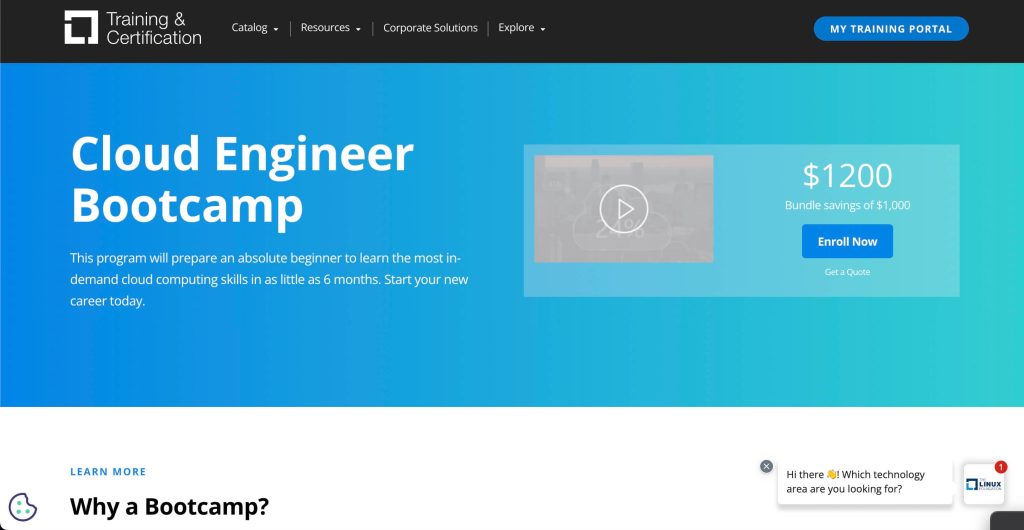
For example, in the Cloud Engineer Bootcamp, you learn from the host of the Cloud Native Computing Foundation, which oversees the most important cloud technologies.

It literally says this in the bullet point!
So yes you’re paying, but you’re also ensured that you’re learning from the source – the arbiter of open source, if you will.
The Linux Foundation: Cloud Engineer Bootcamp
So taking this Cloud Engineer Bootcamp again as the example, this is pretty much the format for all their bootcamps.
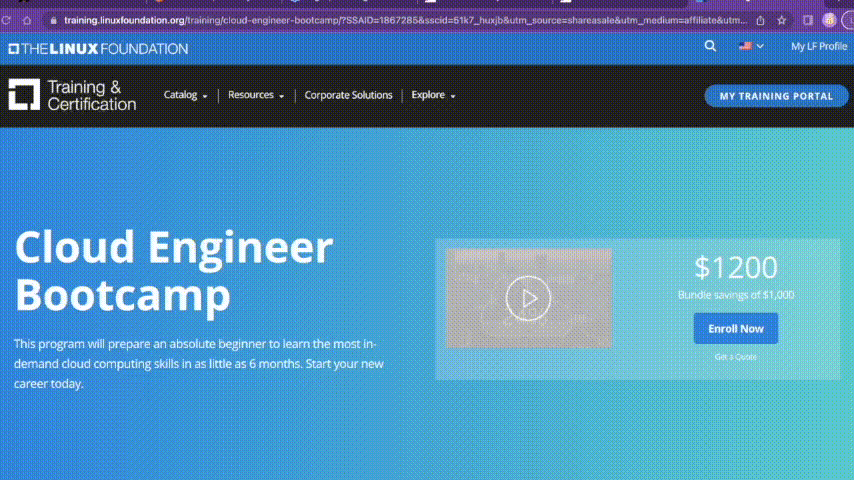
It’s a six month commitment of 15-20 hours a week.
The bootcamp is video based.
You do labs and assignments.
And then you get the chance to meet with your instructor live during office hours.
And again, I think that’s where the real benefit and value is: you get to pick the brain of somebody who’s experienced.
…Who has extremely relevant experience.
In other words, you don’t have to spend 6 hours pecking for answers on Stack Overflow. That Linux Foundation instructor is there to answer it live and direct.
The Linux Foundation: Exams and Certifications
The other thing I do want to point out with these courses… Not just the bootcamps but with their other course offerings, is that they prepare you to get certified by the Linux Foundation.
For example, this Certified Kubernetes Administrator (CKA) program is video based:
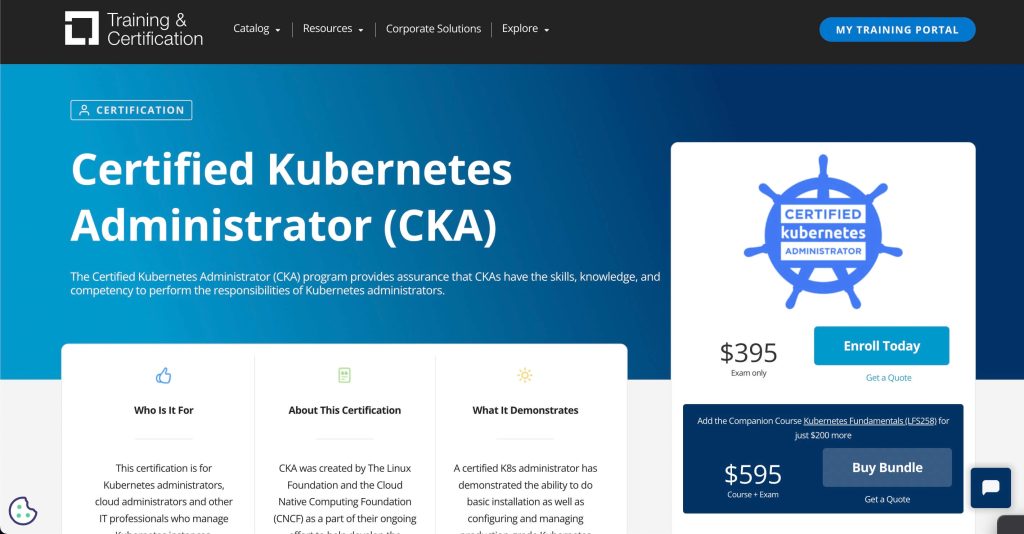
It’s 35 hours of course material, it’s self paced, this part is honestly probably pretty familiar to most of you.
It’s just like your typical video course you’d see on Udemy or even YouTube.
The difference is that The Linux Foundation CKA curriculum is going to prepare you to pass the exam, so you can get certified.
So yes, you can just take the course, do the exercises and be on your merry way.
But if you do the course and then take (and pass) the exam, you are going to get that certified Kubernetes administrator certification.
These exams are an additional fee.
Most of them (if not all) are a few hundred bucks each.
But this certification arguably has weight – especially in an enterprise setting.
These certifications aren’t just something you print off on your old Canon Pixma printer that’s running out of ink.
🚨 This certification can help you get in the industry.
🚨 It can help you level up in the industry.
🚨 It can help you get a promotion.
All that good stuff.
Exploring the Layout of a Typical Course
Now here is what a typical course layout looks like, if you’re doing a bootcamp or a course with a video component.
This course is called a Beginner’s Guide to Open Source Software Development.

If you are looking for cat memes, Instagram thotties explaining basic tech concepts with their butt cheeks or any other type of degeneracy, you will not find it with Linux Foundation curriculum.
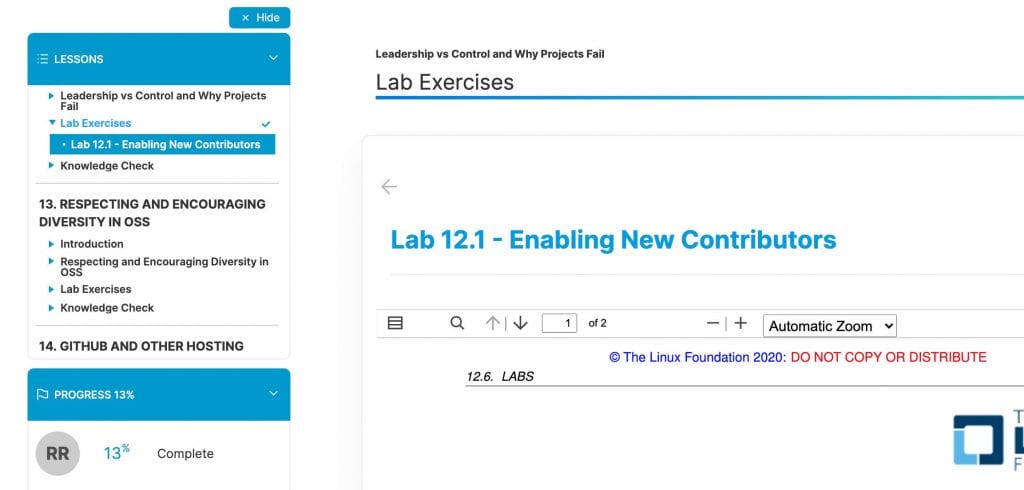
To me it kind of has Coursera vibes.
It is academic.
There are lectures.
And there is a PDF workbook that has lessons, exercises and projects.
This is a well-respected foundation so they’re upholding that image with these materials.
I respect that, but just to give the heads up: no cat memes.

Who Should Use the Linux Foundation?
Overall I recommend The Linux Foundation to a few groups of people.
- People who want to work in an enterprise-level setting, specifically in the fields of system administration, cloud computing, DevOps, Networking and Linux Kernel development.
Now as I shared earlier, the Linux Foundation offers a lot of training in a lot of fields. But I think they excel in these specific categories And taking it further, if you go for the certification as well (which I generally think is a good idea) that certification is going to be valuable, too.
If you’re taking the course here, I think you should definitely take the exam to get certified. The curriculum is designed to get you to pass the exam, so it shouldn’t be too rough on you. - Number two, I also recommend the Linux Foundation to people who are already employed in the tech sector, and want to level up.
- And finally the third group I recommend the Linux Foundation to are people interested in open source technologies who need one-on-one instruction… But don’t want to pay $15,000 for it.
Now not all of these courses have live instructors. But the bootcamps and live trainings do. Just be sure to read the bullet points to make sure you’re getting the live instructor feature.
Who Should NOT Use The Linux Foundation?
On the other hand, if you’re just informally touring the world of tech, or you want to become a web developer?
I do NOT recommend the Linux Foundation as a primary educational platform.
There are more inexpensive options out there.
Also as web developers we’ve always had it pretty good because employers aren’t expecting us to be certified in what we do.
Can we build a React app? OK great, here’s a job.
This is not the case in many other adjacent fields. Employers do wanna see those certifications.
And they do hold weight, they do have value.
Final Thoughts on The Linux Foundation: Best Place to Learn Linux?
The Linux Foundation is a beast.
🐙 Their open source tentacles are everywhere
📈 Linux is recession proof – change my mind!
🔐 And if you want a tech education directly from the source, I highly recommend checking out The Linux Foundation.
Readers of The Linux Foundation are also reading:
